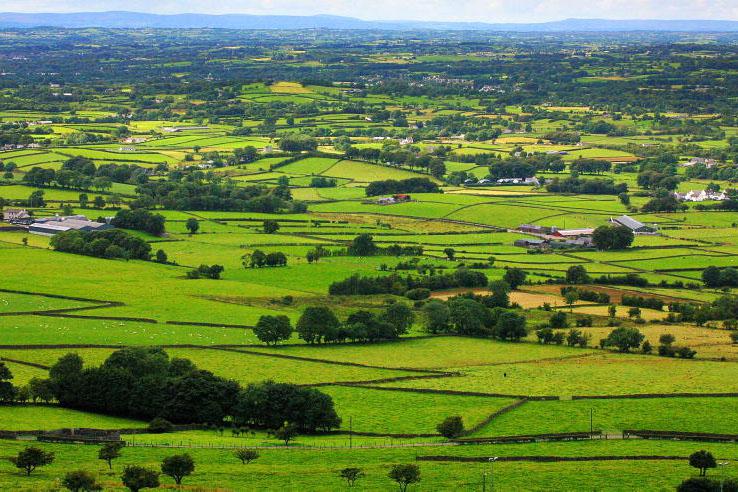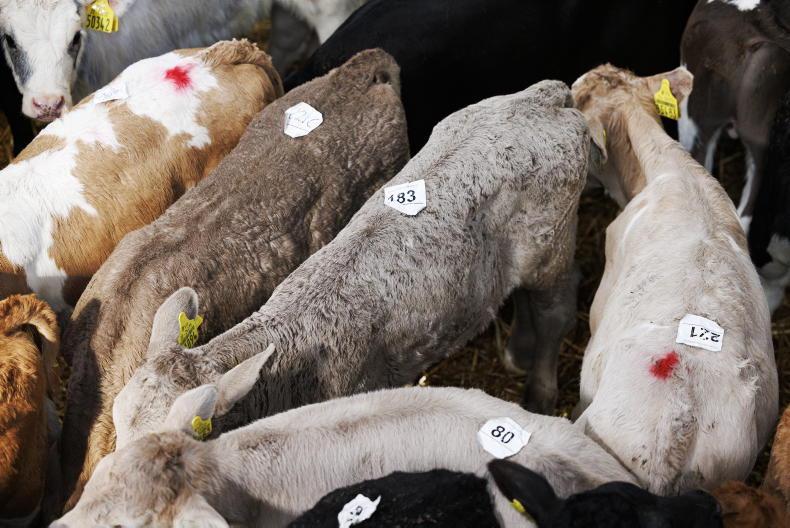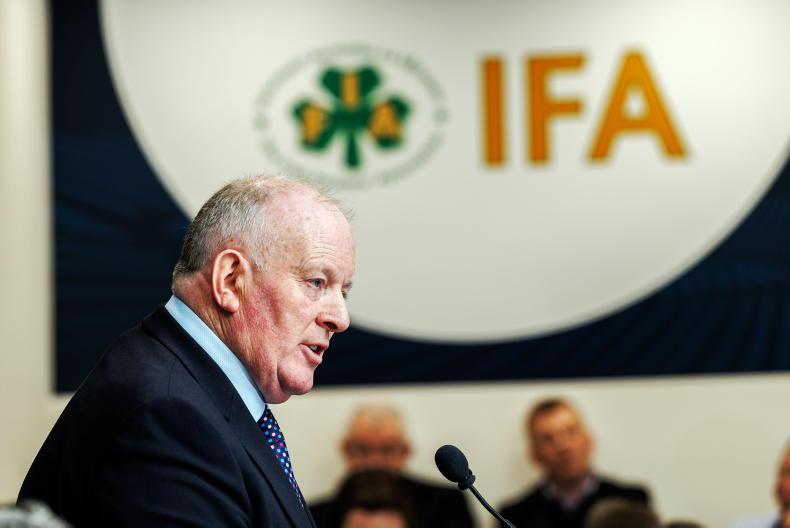Increased CAP funding, an agri-environmental scheme with payments of €15,000 per year and retaining the nitrates derogation are among the Irish Farmers' Association’s (IFA) key asks ahead of the upcoming election.
In its general election manifesto, the IFA also prioritised opposing unfair trade deals such as Mercosur, a halt to further regulation on farmers, support for vulnerable sectors and a long-term solution to the residential zoned land tax (RZLT).
The IFA's submission to political parties and general election 2024 candidates called for increased CAP funding, with the farm organisation reiterating that a standalone environmental budget separate to CAP is needed.
“This fund should include support for farmers with designated land and any actions that may arise [from] the EU Nature Restoration Law.
“Future generations will not commit to farming without more certainty on funding streams,” it said.
The farm organisation added that there should be transition years when moving into a new CAP, where all payments are maintained at current levels.
All farmers should get at least 70% of their Basic Income Support for Sustainability (BISS) payment in mid-October, with issues arriving after this addressed in a balancing payment, it said.
Convergence
The IFA called for any move towards full convergence to only occur through an increase in the CAP budget.
“It must not be funded again by further cuts to farmers with per-hectare payments above the average, with no consideration given to actual amounts received nor its relation to on-farm viability.
“Many of our most progressive farmers, including many small-scale operations, particularly in the most vulnerable farm sectors, suffered the most as a result of this approach,” it added.
Sector-specific supports
In terms of sector-specific supports, the IFA said the government should co-fund the following payments alongside EU budgets:
Sucklers - €300/cow.Sheep - €30/ewe and €40/hill sheep.Tillage - tillage survival scheme €400/ha in 2025 and €250/ha in 2026-2028 for additional, and retained, cereal crops grown.Calf rearing - €100/dairy-beef calf.Beef sustainability - €100/dairy and suckling yearling. ACRES
The IFA manifesto also called for an “overhaul” of the flagship agri-environmental scheme under the current CAP, the Agri-Climate Rural Environment Scheme (ACRES).
It added that a new whole-farm environmental scheme, similar to ACRES’ predecessor REPS, with minimum payments of €15,000 annually be introduced.
This new scheme should have higher payments for hill farmers, designated natura special areas of conservation (SAC) and areas of protection (SPA).
Derogation
The manifesto outlined the importance of retaining the nitrates derogation. It said its loss would not only affect thousands of farmers across all sectors, but “have a huge knock-on social impact on rural Ireland”.
It proposed “targeted and tailored” measures with regard to improving water quality that would have enough time to work “to mitigate potential nutrient loss from farms to our catchments rather than blunt blanket instruments”.
A nitrates derogation being granted for a longer period of time was also called for.
“The capacity to grant a nitrates derogation for longer than four years should be pursued in order to affirm the viability of sustainable grass-based production systems which offer multiple environmental and animal welfare benefits.
“Any reduction in the derogation will in fact be counterproductive in terms of achieving various environmental and sustainability objectives,” it added.
RZLT
The need for there to be less regulation on farmers and for existing regulation to be simplified was outlined in several aspects of the IFA’s general election manifesto.
Calling for government support for vulnerable farming sectors also featured in several areas.
On the RZLT, the farm organisation said the provision in Budget 2025 which said farmers could apply to their local authority to have their land rezoned, which should be accommodated, “will not solve the problem” and a “permanent solution is required”.
“All genuinely farmed land must be permanently exempted from RZLT. Local authorities must ensure only land required in the immediate future, which is fully serviced, is zoned and included in maps for RZLT.
“Where a farmer wants their land dezoned, this should be granted,” it said.
Retirement scheme
The IFA has also included a farm retirement scheme among its asks ahead of the election.
“The CAP must ensure young farmers are attracted to the sector through tailored tax incentives, policy instruments and farm schemes.
“Ireland and Europe have a high level of owner-occupancy of farms and the sustainability and viability of the sector requires that the family farm can be transferred between generations with the minimum of administrative complexities, legal costs and tax exposure,” it said.
To encourage generational renewal in farming, it proposed the introduction of a farm retirement scheme and a taxation policy to incentivise young trained farmers.
The farm organisation added that the €70,000 limit placed on young trained farmers under article 18 of European Commission regulations should be removed.
Increased CAP funding, an agri-environmental scheme with payments of €15,000 per year and retaining the nitrates derogation are among the Irish Farmers' Association’s (IFA) key asks ahead of the upcoming election.
In its general election manifesto, the IFA also prioritised opposing unfair trade deals such as Mercosur, a halt to further regulation on farmers, support for vulnerable sectors and a long-term solution to the residential zoned land tax (RZLT).
The IFA's submission to political parties and general election 2024 candidates called for increased CAP funding, with the farm organisation reiterating that a standalone environmental budget separate to CAP is needed.
“This fund should include support for farmers with designated land and any actions that may arise [from] the EU Nature Restoration Law.
“Future generations will not commit to farming without more certainty on funding streams,” it said.
The farm organisation added that there should be transition years when moving into a new CAP, where all payments are maintained at current levels.
All farmers should get at least 70% of their Basic Income Support for Sustainability (BISS) payment in mid-October, with issues arriving after this addressed in a balancing payment, it said.
Convergence
The IFA called for any move towards full convergence to only occur through an increase in the CAP budget.
“It must not be funded again by further cuts to farmers with per-hectare payments above the average, with no consideration given to actual amounts received nor its relation to on-farm viability.
“Many of our most progressive farmers, including many small-scale operations, particularly in the most vulnerable farm sectors, suffered the most as a result of this approach,” it added.
Sector-specific supports
In terms of sector-specific supports, the IFA said the government should co-fund the following payments alongside EU budgets:
Sucklers - €300/cow.Sheep - €30/ewe and €40/hill sheep.Tillage - tillage survival scheme €400/ha in 2025 and €250/ha in 2026-2028 for additional, and retained, cereal crops grown.Calf rearing - €100/dairy-beef calf.Beef sustainability - €100/dairy and suckling yearling. ACRES
The IFA manifesto also called for an “overhaul” of the flagship agri-environmental scheme under the current CAP, the Agri-Climate Rural Environment Scheme (ACRES).
It added that a new whole-farm environmental scheme, similar to ACRES’ predecessor REPS, with minimum payments of €15,000 annually be introduced.
This new scheme should have higher payments for hill farmers, designated natura special areas of conservation (SAC) and areas of protection (SPA).
Derogation
The manifesto outlined the importance of retaining the nitrates derogation. It said its loss would not only affect thousands of farmers across all sectors, but “have a huge knock-on social impact on rural Ireland”.
It proposed “targeted and tailored” measures with regard to improving water quality that would have enough time to work “to mitigate potential nutrient loss from farms to our catchments rather than blunt blanket instruments”.
A nitrates derogation being granted for a longer period of time was also called for.
“The capacity to grant a nitrates derogation for longer than four years should be pursued in order to affirm the viability of sustainable grass-based production systems which offer multiple environmental and animal welfare benefits.
“Any reduction in the derogation will in fact be counterproductive in terms of achieving various environmental and sustainability objectives,” it added.
RZLT
The need for there to be less regulation on farmers and for existing regulation to be simplified was outlined in several aspects of the IFA’s general election manifesto.
Calling for government support for vulnerable farming sectors also featured in several areas.
On the RZLT, the farm organisation said the provision in Budget 2025 which said farmers could apply to their local authority to have their land rezoned, which should be accommodated, “will not solve the problem” and a “permanent solution is required”.
“All genuinely farmed land must be permanently exempted from RZLT. Local authorities must ensure only land required in the immediate future, which is fully serviced, is zoned and included in maps for RZLT.
“Where a farmer wants their land dezoned, this should be granted,” it said.
Retirement scheme
The IFA has also included a farm retirement scheme among its asks ahead of the election.
“The CAP must ensure young farmers are attracted to the sector through tailored tax incentives, policy instruments and farm schemes.
“Ireland and Europe have a high level of owner-occupancy of farms and the sustainability and viability of the sector requires that the family farm can be transferred between generations with the minimum of administrative complexities, legal costs and tax exposure,” it said.
To encourage generational renewal in farming, it proposed the introduction of a farm retirement scheme and a taxation policy to incentivise young trained farmers.
The farm organisation added that the €70,000 limit placed on young trained farmers under article 18 of European Commission regulations should be removed.









SHARING OPTIONS